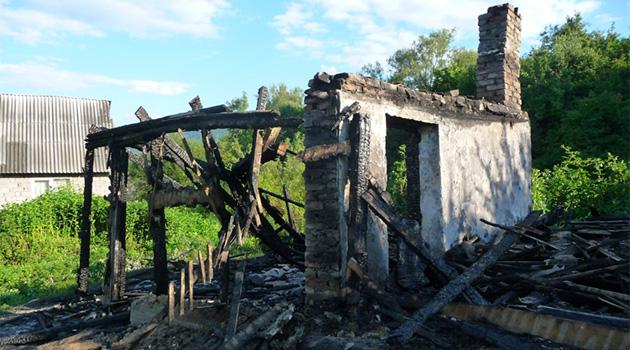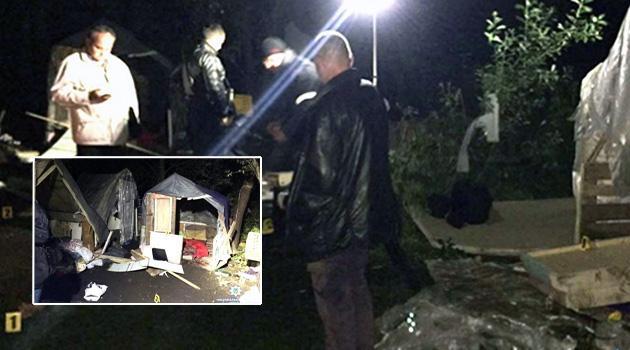Ukraine: Recent pogroms against Roma costing lives around the country

Michael Beníšek, a university instructor and Romani Studies scholar who lectures at Charles University in Prague reports from the Ukrainian city of Uzhhorod that “Nationalism is generally growing in Ukraine. This is partially connected with the war in eastern Ukraine, which has brought about an increase of nationalist passions. Everywhere in the streets here, for example, you can see signs reading ‘Glory to the nation!’ on the streets, on lampposts – I don’t recall seeing that kind of thing in Transcarpathia before.”
The scholar has long dedicated himself to linguistic research among Romani people living in Transcarpathian Ukraine. He is currently there now and following the events of recent days, during which several Romani communities have been attacked.
Some of these incidents have cost people their lives. For some of them a racist motivation has already been proven, while for others such motivation is just speculation so far and the perpetrators remain at large.
The most recent attack happened just a couple of days ago in a place the researcher knows very well. Somebody set a house on fire where a mother and her three children were sleeping in a Romani settlement in the town of Perechyn – fortunately they managed to escape in time.
Local Roma are now living in a state of great fear, the researcher reports. “The men in Perechyn, for example, are patrolling the entire settlement at night. There is a great deal of fear of the future there. People do not know what will happen next,” he says in an interview for the Czech Government’s Hate Free Culture project, which news server Romea.cz reprints in full translation below.
“Romani people are mostly mentioning encountering hatred that is not just from ultra-right people or those who are part of neo-Nazi groups. Frequently it comes from absolutely ordinary people,” the researcher says.
Frustrations, in Beníšek’s view, are behind the hate. “There is poverty here, along with the war against Ukraine the prices have rapidly risen here while pay is very low. […] Many people have no work at all. Because they are frustrated, they are choosing those who are even worse off as their targets,” he says.
Q: What is happening in Ukraine in relation to Romani people now?
A: Several pogroms against temporary Romani campsites have been perpetrated during the last few months. These are not permanent Romani settlements, but camps that Romani people set up in Transcarpathian Ukraine on the outskirts of bigger towns and throughout the entire country – primarily in Kyiv, but also in Halich near Lviv or near the city of Ternopol, where one such attack happened. The Transcarpathian Romani people are longterm settlers here, not Romani people who traditionally travel or live in a semi-sedentary way, but they have commuted to different towns here for work since the Soviet era. They always set up a base in the forest, or in a forested park near the bigger towns, live there temporarily, and do their best to make a living somehow. They collect old iron and resell it, or old clothes, and the women sometimes beg. After a time they return with their earnings to Transcarpathia. This is basically a certain form of quasi-travelling that is forced upon them by their socioeconomic situation. The attacks that have happened in recent months were organized by neo-Nazi groups or by people connected to them. Their aim was to destroy these Romani camps. The attackers arrived there, for example, with axes and began to chop down the tents and temporary dwellings, to drive the Romani people away. The attack that launched the first bigger wave of interest in this subject happened at the end of June in Lviv. Armed youths burst into a camp and stabbed some people – one young man did not survive and others ended up in hospital, including a 10-year- old child. The people attacked were Hungarian-speaking Roma from the village of Serne in the south, from Mukachev district, who also were traveling for work in that fashion. Now they have returned to Serne, where the funeral took place, and several international journalists attended it.
Q: How did the local public react to the attacks?
A: Yesterday I spoke with one non-Romani man and one Romani man who attended the funeral near Mukacheve. They said he was the only non-Romani person there besides the journalists. Nobody came from the local village council or from the non-Romani villagers, just Romani people attended. That is one of the other things Romani people are pointing out here, that they are left alone to deal with all of this. When, for example, an anti-racist demonstration was organized in Uzhhorod, just Romani people attended. They do not feel any support from non-Roma here. In the Czech Republic, or in Slovakia, there are groups of anti-racist or liberally-attuned gadje who somehow are engaged on behalf of the Romani people, in their favor. There is nothing of the kind here. Romani people also complain that during the last year they have felt a big tension here that has never existed before. Simple people on the street display their hatred toward the Roma, non-verbally and verbally. On the Internet, according to them, a strong antigypsyist wave has begun that is apparently even worse than in the Czech Republic. On Facebook, or in discussions beneath articles on news servers, many people are writing that it’s necessary to murder Romani people and approving of the murders I have spoken of.
Q: Is it apparent that these are hate incidents? Or is that rather speculation?
A: On Sunday there was another incident. A Romani woman was murdered in southern Transcarpathia, in the town of Berehovo, where Hungarian-speaking Romani people also live. Somebody slit her throat. It is not yet known what the circumstances and motivation for that attack was. In Lviv, on the other hand, the motivation was apparent because they managed to apprehend the perpetrator and allegedly they were youths who espouse a neo-Nazi organization. Here, with the murder in Berehovo, where somebody slit that woman’s throat, they don’t know who did it. So whether it might have had a racist subtext is a speculation – nevertheless, in the light of these other events, that is the assumption.
Q: Why is this change of atmosphere happening?
A: Nationalism is generally growing in Ukraine. This is partially connected with the war in eastern Ukraine, which has brought about an increase of nationalist passions. Everywhere in the streets here, for example, you can see signs reading ‘Glory to the nation!’ on the streets, on lampposts – I don’t recall seeing that kind of thing in Transcarpathia before. This kind of thing was just in Halich, where I spent time with Romani communities in 2011 and 2012 and recorded Romani testimonies of Ukrainian nationalists behavingly badly and calling those who contributed to the genocide of the Jews and the Roma during the Second world War “heroes.” The nationalists basically were telling the Roma there that they don’t want them around and that somebody should murder them. I never encountered that here in Transcarpathia until this past year. Before there were problems with police here, during the time before Maidan, when from time to time Romani people would be arrested for no reason, beaten up at the station, and then released, or the police would drive to the Romani settlements, jump out of trucks, and flog the children and women with their batons. Today we are not encountering reports of that kind. The police today behave better, at least on the surface, which Romani people themselves are confirming. They have reformed the Ukrainian police, the Berkut unit was dissolved after Maidan, because it had participated in firing weapons at the demonstrators. So the police may have changed, but it is said that they are taking a lax approach toward investigating and prosecuting anti-Romani incidents.
Q: What happened in Perechyn, a place you have visited repeatedly where you know the situation well?
A: In the late hours of Sunday and early morning hours of Monday a small fire first began at one house. Firefighters and police arrived, put out the fire, and the officers believed it was an accident that could have been started by an electrical short. After they left, however, the house caught fire again. The mother with three children who lived there even heard somebody knock on the window, it woke her up. Those people are said to have escaped. When she noticed the house was on fire again she got hold of the children, ran outside, and began to call for help. The entire settlement ran there and people began to quickly carry everything out of the burning house that could still be saved. The firefighters and police returned and said that somebody had to have intentionally set that fire.
Q: Who?
A: The Roma in Perechyn just say they were “rakle” [non-Romani youths], but they haven’t apprehended anybody yet. It’s interesting that the house was located absolutely on the edge of the settlement, by the forest. The speculation is that the arsonists came by way of the forest, then hid there after the first fire and after the firefighters and police left, they set it on fire again. It was a mostly wooden house, so it was a good target in that sense, because most of the constructions in that settlement are brick. There was also easy access to that building from the forest.
Q: How do the locals perceive these events?
A: I personally arrived there the next day in the afternoon and I was rather surprised by the atmosphere, which was actually grave. The police were there at the time, at the home of the local “baron”, and all the Roma had assembled there and were addressing the situation together. However, the police set up the gathering in such a way that instead of assuring the Roma they would be protected, they urged them not to “cause problems” themselves. A Romani pastor who is active there was absolutely broken-hearted. He said he is on the blacklist of the neo-Nazis as a person who aids Romani people and who must be one of the first to be murdered when they get the chance.
Q: How do the local Roma assess that incident? Who do they believe set the house on fire?
A: They see it as a hate crime and all indications are that it was. The police are reportedly also working with a version of the motivation in which the Romani people themselves set the house on fire. However, when I was at the scene, nobody indicated anything of the sort. The question is why the Roma would have set fire to the home of that woman in particular – I know her personally. She is a very poor, young mother of three.
Q: What is the general atmosphere like among the Roma there?
A: The men in Perechyn, for example, are patrolling the entire settlement at night. There is a great deal of fear of the future there. People do not know what will happen next. Some are considering emigration, they would like to get away from here. The Roma are mentioning that they are encountering hatred, and not just from people who are ultra-right or part of neo-Nazi groups. Frequently they are absolutely ordinary people who are accepting the anti-Romani atmosphere that is on the verge of showing the characteristics of mob psychosis.
Q: Where is that coming from?
A: There is poverty here, along with the war against Ukraine the prices have rapidly risen here while pay is very low. People earn the equivalent of CZK 3 000 – CZK 4 000 [EUR 115 – 150] per month. Many have no work at all. Because they are frustrated, they are choosing those who are even worse off as their targets.
First published on www.hatefree.cz.
